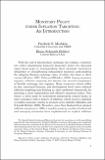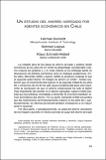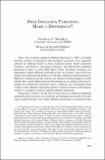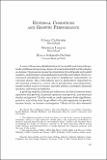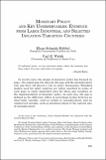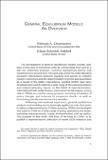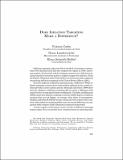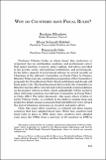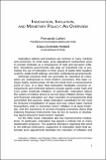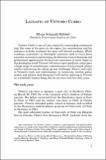Buscar
Mostrando ítems 1-10 de 18
Monetary policy under inflation targeting: an introduction
With the end of intermediate exchange rate regimes, countries are either abandoning domestic monetary policy (by choosing super-hard pegs or relinquishing their national currencies altogether) or strengthening independent monetary policymaking (by adopting floating exchange rates, of either the clean ...
Un estudio del ahorro agregado por agentes económicos en Chile
La notable alza de las tasas de ahorro privado y público desde comienzos de los años 80 en Chile ha despertado considerable interés. Este interés se ha reflejado tanto en discusiones de política económica como en trabajos académicos. Entre ellos, Morandé (1998) y Agosín (1999) se proponen explicar lo ...
Does inflation targeting make a difference?
Since New Zealand adopted inflation targeting in 1990, a steadily growing number of industrial and emerging economies have explicitly adopted an inflation target as their nominal anchor. Eight industrial countries and thirteen emerging economies had full-fledged inflation targeting in place in early ...
External conditions and growth performance
A central dimension of globalization is the world trend toward larger trade and financial openness, observed in most industrial and developing economies. Openness increases the integration of world goods and capital markets, contributing to potential gains in growth and welfare. However, increased ...
Monetary policy and key unobservables: evidence from large industrial and selected inflation-targeting countries
In recent years, the design of monetary policy has focused on gaps—the output gap, the interest rate gap, and the unemployment rate gap have all played a role in policy discussions. Standard models used for policy analysis are either specified in terms of such gaps or imply important roles for these ...
General equilibrium models: an overview
The development of general equilibrium models (GEMs) goes back a long way in economics, both at a theoretical level and as a tool for empirical analysis. General equilibrium theory and modeling have proved to be relevant and useful for understanding economic interactions between markets and agents in ...
Does inflation targeting make a difference?
Inflation targeting is the new kid on the block of monetary regimes. Since New Zealand and Chile first adopted the regime in 1990, a growing number of industrial and developing countries have followed suit, anchoring their monetary policy to explicit targets for inflation.
Why do countries have fiscal rules?
Professor Vittorio Corbo in whose honor this conference is organized has an outstanding academic and professional career that spans teaching research policy making and advice provided to the private sector international institutions and governments. In the latter capacity of government advisor he ...
Indexation, inflation, and monetary policy: an overview
Indexation policies and practices are common in many markets and economies. In most cases, price adjustment mechanisms arise in private contracts as a consequence of high and pervasive inflation. Sometimes governments also play an important role in promoting the use of indexation in their issues of ...
Laudatio of Vittorio Corbo
Vittorio Corbo is one of Latin America’s outstanding economists and like some of his peers in the region his contributions and his influence includes academia but goes well beyond academia. While academic economists in developed countries tend to focus more narrowly on research and teaching the diversity ...

